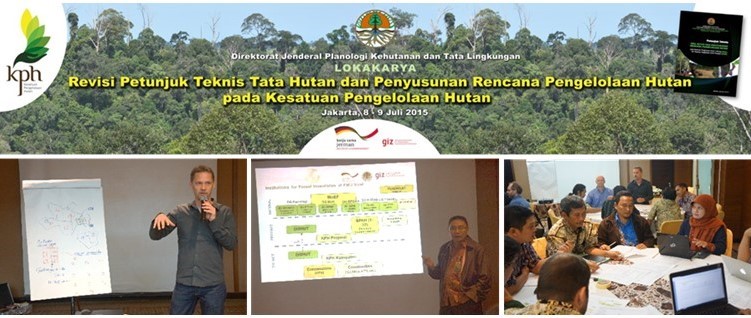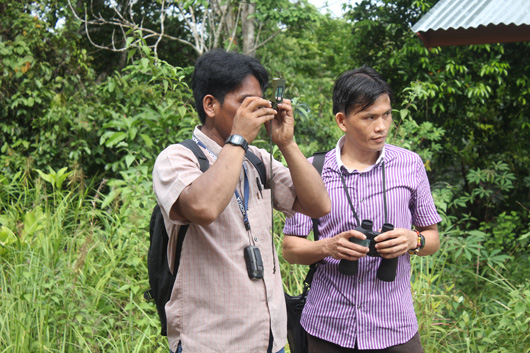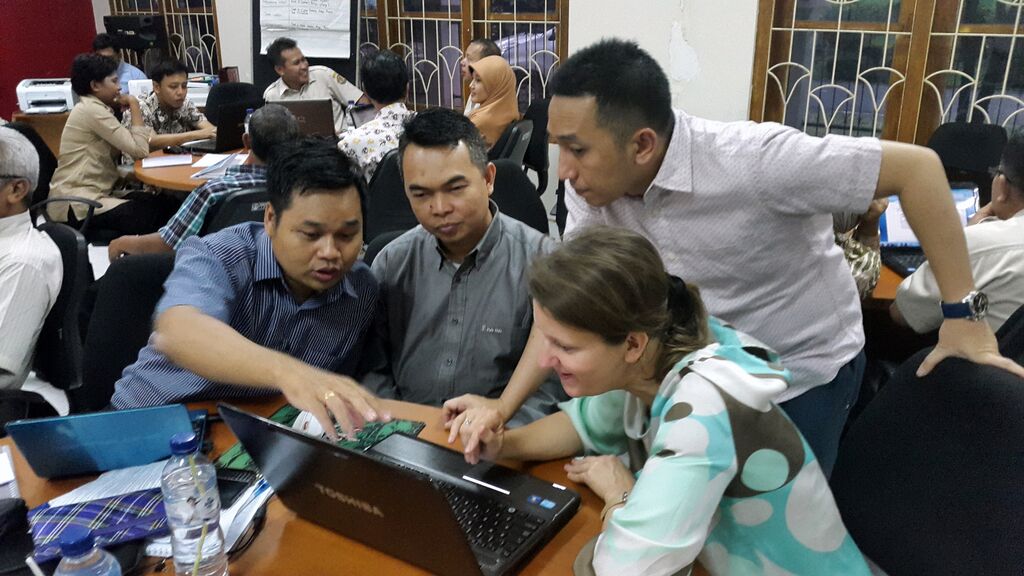FORCLIME
Forests and Climate Change ProgrammeTechnical Cooperation (TC Module)

Select your language

Forest inventories as the systematic collection of forest data and information provide the basis for all further analyses and planning steps for FMUs as defined in long-term as well as annual business plans.
The application of sound and efficient forest inventory methods at FMU level is a precondition for the formulation of 10-year as well as annual management plans of forest management units (FMU) and therefore of central importance to the forest sector reform of the Indonesian Government. Specific inventories need to be conducted at regular intervals at FMU and resort (RPH) and compartment level to provide the basis for forest management by determining the potential of forest and non-timber forest products but also assessing biodiversity, environmental services (e.g. carbon, water, soil conservation) and socio-economic conditions of forest dependent people.
Consequently the selection of the inventory method depends on the following aspects: 1) inventory objective, 2) regulations/standards, 3) forest condition, 4) desired accuracy and 5) available budget, human resources and desired timeframe.
In its support to the Directorate General for Forest Planning and Environmental Governance of the Ministry of Environment and Forestry, FORCLIME is cooperating with the University of Goettingen (ForestEye) as an international consultant specialized in forest monitoring and forest inventory methods. The team of ForestEye including Dr Lutz Fehrmann and Nils Noelke provide specific scientific support and inputs on the revision of the MoEF forest inventory guidelines monitoring methodologies and offer specific training modules for national and subnational stakeholders in the context of FMU planning.
During the opening session the Director General, Prof. San Afri Awang and Director of Forest Resource Inventory and Monitoring, Ruandha Agung Sugardiman, stressed the importance to implement sound forest inventory methods that can address the multitude of information requirements of an FMU. Consequently the revised guidance should provide minimum criteria but enough flexibility to accommodate different information needs, ecological and socio-economic conditions of different FMUs.
The results from this workshop will help to further revise the guidance, set up specific trainings for national and subnational partners and to initiate a revision of the NFI methodology.
For further information please contact Mathias Bertram (Strategic Area Manager Forest Policy): mathias.bertram@giz.de

During its planning preparation, FORCLIME technical and financial cooperation put into account suggestions proposed by the local community if the ideas are long term investments. One of suggestions from the local communities are to improve their capacity in patrolling in order to enhance capability for preventing illegal activities as well as monitoring the biodiversity in Tana Olen. This community based forest patrol will be undertaken by the community group for forest management (Kelompok Masyarakat Pengelolaan Hutan - KMPH) at 12 villages in Bahau Hulu and Pujungan sub districts of Malinau district
Therefore, the KMPH members were trained for three days in order to have a better understanding on the concept of community based patrol, monitoring the biodiversity, law and regulations and customary law as well. In addition, the KMPH members were also introduced to report preparation and using relevant tools. The resource persons and facilitator on this meeting were experts from the District Project Management Unit (DPMU), the National Park of Kayang Mentarang, GFA _a consulting company) and GIZ FORCLIME.
At the end of the training period, most of villages were ready to carry out patrolling at the forest of tana olen. The implementation of the patrol will be monitored in order to obtain lessons that will be used for improvement for the following implementation. Furthermore, FORCLIME is expected to support the facilitation processes in preparing the local regulation concerning natural resources management at the two sub districts.
For more detail information, please contact:
Indah Astuti – forest expert at the DPMU Malinau
Ismet Khaeruddin, Strategic Area Manager for Biodiversity and Management of Protected Areas

“Offering E-Learning seems to be a huge opportunity to us”, Peter Reger from the Indonesian Chamber of Commerce and Industry (KADIN) enthusiastically resumes. The Center for Forestry Education and Training (CFET) and GIZ FORCLIME were delighted to be able to share their experiences with the KADIN Business Helpdesk on 12th of June 2015 in Jakarta. Since September 2015, FORCLIME’s Strategic Area “Human Capacity Development” supports CFET with the implementation of E-Learning. Building on numerous types of media that deliver text, audio, images, animation, and streaming video, this computer-based learning approach is also gaining importance for other GIZ supported institutions such as the Training Center for Geology. Sulamith Kastl from the BGR Georisk Project notes: “We think it is a great opportunity to learn from the experiences of another training institution here in Indonesia. This allows us to better understand the options and challenges have been faced by the colleagues in Bogor”
Currently CFET is very active in developing three trainings using a blended learning approach which is a combination of E-learning and classic training approaches: 1) REDD+ and Climate Change, 2) Development of Collaboration in Forest Management Units and 3) Mapping of forest land tenure based conflicts via rapid land tenure assessment methods. The development is a joint activity of all 7 regional forestry training centers (BDK). All three trainings will have an online phase to introduce important knowledge and prepare the face to face training (f2f). Through discussion on the Learning Management System (Moodle) as well as first field activities, the f2f training enables participants to build competencies according to the demands on field level. The pilot project will be conducted in October 2015. Therefore Moodle has to be set up accordingly, the online modules have to be developed and the online facilitation has to be planned. To enrich these E-Learning competencies, 50 persons from CFET and BDK are currently involved in an online training from June until August 2015. During this online training space will be given to improve the E-Learning modules and to discuss challenges as well as open questions.
One open question will be tackled jointly by GIZ-Programs and other Indonesian-German projects, in which people are currently working on the implementation of E-Learning in governmental institutions in Indonesia. There needs to be a discussion with the State Administration Agency (LAN), as the authority in charge, which regulations for state training institutions, that use E-Learning, are available or need to be issued.
“We think the joint cooperation of Indonesian GIZ-Programs is a great possibility to upscale our E-Learning activities with our partners”, says Anne-Cathrin Vonarx, Development Adviser for Human Capacity Development. Cooperation partners are the Training Center for Geology, supported by the BGR Georisk Project, the Training Centers of the Ministry of Social Affairs, which is supported by the GIZ Social Protection Programme, as well as the Training Centers for the Ministry of Finance, which is supported by GIZ TRANSFORMASI.“With these efforts we want to contribute to the sustainability and efficiency of GIZ in Indonesia”, Edy Marbyanto, Manager of the Strategic Area “Human Capacity Development adds.
For further information, please contact Anne-Cathrin Vonarx, Strategic Area “Human Capacity Development” FORCLIME


